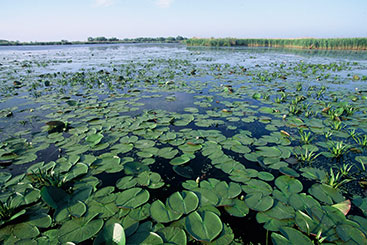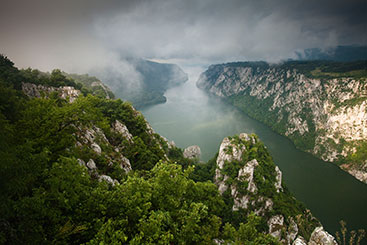A new partnership for wetland restoration

A new partnership for wetland restoration
A seven-year partnership between WWF and the Coca-Cola Company is working to conserve and restore vital wetland habitats and reconnect former floodplains in six Danube countries by 2020.

Fish and wildlife will benefit from the restoration projects as will reconstructed wetlands that help conserve freshwater resources. © WWF-Canon/Michel Gunther
Over the past 150 years, the Danube has seen 80% of its floodplains and wetlands disappear. This damage has mainly been caused by dykes, dredging and damming, which has taken place for a number of reasons including the need for hydroelectric
power and shipping, and to keep floodwaters at bay. As a result, damaged wetlands can no longer provide much needed biodiversity hotspots – plummeting fish and wildlife populations – or act as buffers to floodwaters.
At the end of the 12th Standing Working Group meeting of the ICPDR in Sofia, the WWF – the nature conservation organisation – and The Coca-Cola Company announced a seven-year partnership called ‘For a Living Danube’. The partnership aims to restore wetland habitats and floodplains in Hungary, Croatia, Serbia, Romania and Bulgaria and a unique habitat in Austria.
“Together, WWF and The Coca-Cola Company – alongside local authorities and organisations in the countries that the Danube River passes through – will conserve and restore these vital wetlands and floodplains for the benefit of people and nature,” said Andreas Beckmann, Director of the WWF Danube-Carpathian Programme. “At the same time, we intend to create a regional movement for wetland conservation and restoration, as well as good water stewardship.”
A variety of measures will be undertaken, such as removing dykes and dams to reconnect former floodplains, restoring the habitats of threatened and endangered species and recreating river side-arms to improve flood retention capacity and ecotourism opportunities. In all, nine projects will restore wetland habitats with a total area of over 7.400 football pitches (53 km2) and increase the river capacity by the equivalent of 4.800 Olympic sized swimming pools (12 million m2) by 2020.
A record size in restoration projects. The long-term partnership between The Coca-Cola Company and WWF has helped improve the ecological health of seven of the world’s most important freshwater basins (including the Danube), improved the Coca- Cola system’s water efficiency by 20%, worked to prevent 5 million metric tons of CO2 emissions across Coca-Cola’s global manufacturing operations and promoted more sustainable agricultural practices in the company’s supply chain.
“We’ve been working with the WWF since 2007 to help conserve freshwater resources around the world and to make meaningful changes to our business,” said Ulrike Sapiro, Director of Community and Environment for Coca-Cola in Europe. “This is the biggest single programme in Europe that The Coca-Cola Foundation has supported to date.”
The total cost of the restoration projects of the ‘For a Living Danube’ partnership is estimated at US$14 million, with US$4.4 million coming through the grant of The Coca Cola Foundation, and the rest from EU funds and other sources.
To raise awareness of wetland conservation and restoration, a Living Danube Tour will visit more than 25 locations across Bulgaria, Croatia, Hungary, Romania and Serbia by the end of summer 2015. The tour demonstrates the importance of wetlands
and floodplains for the wellbeing of peopleandnatureusingengagingandeducational tools.

The long-term partnership between The Coca-Cola Company and WWF has helped improve the ecological health of seven of the world’s most important freshwater basins, including the Danube. © Wild Wonders of Europe/Ruben Smit/WWF
RESTORATION PROJECTS AT A GLANCE
Bulgaria
The projects will focus on the Lower Danube Green Corridor, one of Europe’s most ambitious wetland protection and restoration initiatives. The aim is to restore over 30km² of river habitats home to six threatened and endangered fish species by removing migration obstacles and building a fish pass. This restoration work, along with targeted conservation activities for these species (such as restocking), will help improve the river’s conservation status.
Croatia and Hungary
The restoration work will be conducted on the Barcs–Old–Drava oxbow, a natural riverside lake on the left side of the Drava River. Led by Hungary, this transboundary restoration work will demonstrate a simple and cost effective way of improving the ecological status of the wetlands and surrounding forests, so as to develop ecotourism.
The project will also focus on restoration activities along the Drava River in Croatia, which is part of the future fivecountry Mura–Drava–Danube Transboundary Biosphere Reserve, sometimes referred to as “Europe’s Amazon”, as it stretches from Austria, across Slovenia, Hungary, Croatia and onto Serbia. The aim is to restore or recreate five sidearms to improve natural river dynamics and habitats, flood risk mitigation, ecotourism and recreation.
Romania
The projects will focus on restoration work at the former Garla Mare Fish Farm along the Lower Danube Green Corridor. The aim is to connect the transformed wetlands to the Danube River – which will not only produce ecological benefits, but will improve the river’s retention capacity in the event of future flooding. It will also provide ground for sustainable land use such as grazing or bee keeping. In total, 5 million m³ of freshwater will be returned to nature.
Serbia
The project will focus on restoration work on the Bestrement oxbow, situated in the Special Nature Reserve Gornje Podunavlje. This lies in the Danube floodplain, but is disconnected from the river by dykes and almost totally overgrown by reeds and willows that are closing the open water.
In the past, the area was a very important breeding site and migration stopover for up to 700 pairs of heron, but it has vanished as a result of drying and lack of feeding sites. The aim is to improve the water regime throughout the year using existing irrigation canals by construction of a sluice.
Austria
The project aims to restore the last soda lakes, a unique habitat next to Lake Neusiedl and close to Coca-Cola’s Edelstal production facility. These milky-white lakes are threatened by poor drainage channels and consequently by lower ground water levels, which interrupts salt transport from the groundwater to the soil surface.
The project will close drainage ditches and thus raise the groundwater table to former levels, bringing back to nature 650,000 to 1,000,000 m3 of water. Local tourism – which is dependent on the abundance of birds around the salt habitats – will also benefit, as well as agriculture, which also suffers from the current low ground water level.
Additional wetland restoration projects in Hungary, Romania and Bulgaria will lead to nature development, flood risk reduction and the enhancement of sustainable land use and economics in their regions.





